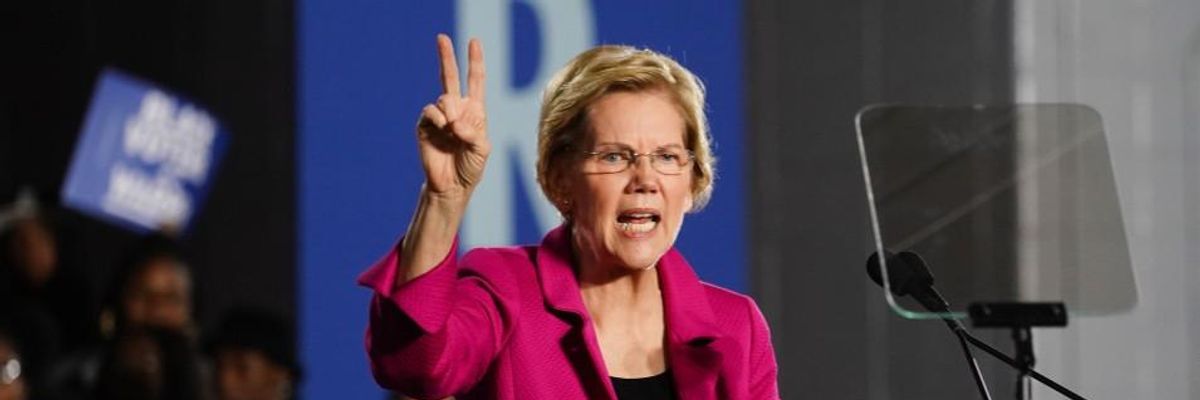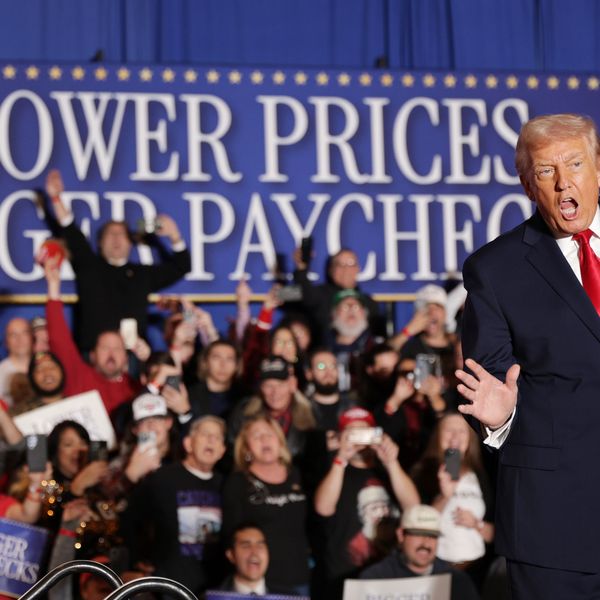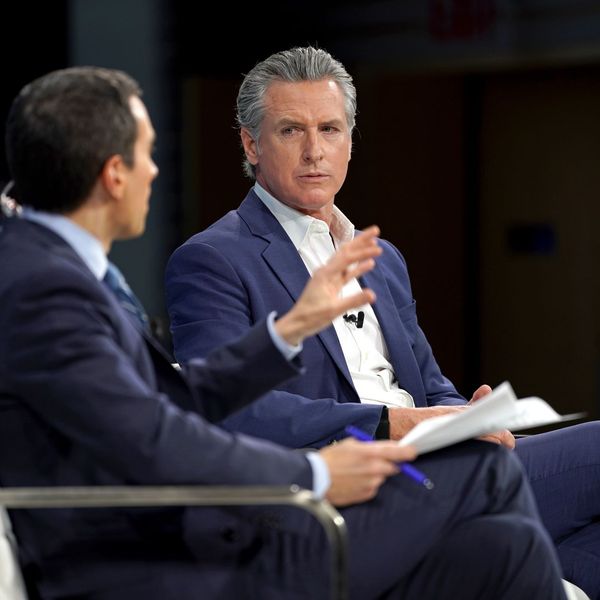
Democratic presidential candidate Sen. Elizabeth Warren (D-Mass.) holds up two fingers to represent her two cent wealth tax while speaking at a campaign event at Clark Atlanta University on November 21, 2019 in Atlanta. (Photo: Elijah Nouvelage/Getty Images)
'See? Not Radical': New Poll Shows Nearly Two-Thirds of Americans Support a Wealth Tax to Fund Universal Programs
"It's simple. The majority of Americans believe that we should tax the rich."
Supporters of a wealth tax to combat persistent economic inequality in the U.S. pointed to recent polling by Reuters/Ipsos showing that nearly two-thirds of respondents support taxing the rich at higher rates to support programs that would benefit all Americans.
Sixty-four percent of respondents said they either strongly or "somewhat" agreed with the statement, "The very rich should contribute an extra share of their total wealth each year to support public programs."
The sentiment found support across race, gender, and income demographics as well as from across the political spectrum. Seventy-seven percent of Democrats agreed that the rich should be taxed at a higher rate, while 53% of Republicans agreed.
Meanwhile, 54% of the poll's 4,441 respondents disagreed with a contrasting statement, that "the very rich should be allowed to keep the money they have, even if that means increasing inequality."
"See? Not radical," tweeted Michael Sayman, a young millionaire and Google executive who has expressed support for Sen. Bernie Sanders (I-Vt.) in the 2020 Democratic primary and has called on the government to "tax the hell out of me" to help support working Americans.
While some centrist Democrats running in the primary have dismissed wealth tax proposals as unrealistic, the plans put forward by the Vermont senator and Sen. Elizabeth Warren (D-Mass.) are not far off from the tax structures which existed in the U.S. for much of the 20th century.
In 2018, the overall tax rate for the 400 wealthiest Americans was just 23%, compared with 70% in 1950 and 47% in 1980.
Under Sanders' wealth tax plan, the government would levy a 1% tax on fortunes between $32 and $50 million, with the rate progressively increasing on richer Americans. The proposal would raise an estimated $4.35 trillion in its first decade, with revenue being used to pay for Medicare for All and other universal programs.
Warren began her presidential campaign a year ago by unveiling her own plan for a wealth tax, calling for a 2% tax on all wealth over $50 million. Warren's proposal would raise $2.75 trillion in its first decade and would affect just 0.1% of U.S. households, while funding her free college tuition for all, universal childcare, and student debt cancellation plans.
Taxing the rich has bipartisan support. Reuters recorded at least one comment from a Trump supporter who said, "It just seems the rich don't pay their share."
The grassroots group Tax March tweeted that the answer to the debate over a wealth tax is "simple."
\u201cIt's simple. The majority of Americans believe that we should #TaxTheRich. \n\nhttps://t.co/lrdYXPsmVD\u201d— Unrig Our Economy (@Unrig Our Economy) 1578667771
"The majority of Americans believe that we should tax the rich," the group said.
An Urgent Message From Our Co-Founder
Dear Common Dreams reader, The U.S. is on a fast track to authoritarianism like nothing I've ever seen. Meanwhile, corporate news outlets are utterly capitulating to Trump, twisting their coverage to avoid drawing his ire while lining up to stuff cash in his pockets. That's why I believe that Common Dreams is doing the best and most consequential reporting that we've ever done. Our small but mighty team is a progressive reporting powerhouse, covering the news every day that the corporate media never will. Our mission has always been simple: To inform. To inspire. And to ignite change for the common good. Now here's the key piece that I want all our readers to understand: None of this would be possible without your financial support. That's not just some fundraising cliche. It's the absolute and literal truth. We don't accept corporate advertising and never will. We don't have a paywall because we don't think people should be blocked from critical news based on their ability to pay. Everything we do is funded by the donations of readers like you. Will you donate now to help power the nonprofit, independent reporting of Common Dreams? Thank you for being a vital member of our community. Together, we can keep independent journalism alive when it’s needed most. - Craig Brown, Co-founder |
Supporters of a wealth tax to combat persistent economic inequality in the U.S. pointed to recent polling by Reuters/Ipsos showing that nearly two-thirds of respondents support taxing the rich at higher rates to support programs that would benefit all Americans.
Sixty-four percent of respondents said they either strongly or "somewhat" agreed with the statement, "The very rich should contribute an extra share of their total wealth each year to support public programs."
The sentiment found support across race, gender, and income demographics as well as from across the political spectrum. Seventy-seven percent of Democrats agreed that the rich should be taxed at a higher rate, while 53% of Republicans agreed.
Meanwhile, 54% of the poll's 4,441 respondents disagreed with a contrasting statement, that "the very rich should be allowed to keep the money they have, even if that means increasing inequality."
"See? Not radical," tweeted Michael Sayman, a young millionaire and Google executive who has expressed support for Sen. Bernie Sanders (I-Vt.) in the 2020 Democratic primary and has called on the government to "tax the hell out of me" to help support working Americans.
While some centrist Democrats running in the primary have dismissed wealth tax proposals as unrealistic, the plans put forward by the Vermont senator and Sen. Elizabeth Warren (D-Mass.) are not far off from the tax structures which existed in the U.S. for much of the 20th century.
In 2018, the overall tax rate for the 400 wealthiest Americans was just 23%, compared with 70% in 1950 and 47% in 1980.
Under Sanders' wealth tax plan, the government would levy a 1% tax on fortunes between $32 and $50 million, with the rate progressively increasing on richer Americans. The proposal would raise an estimated $4.35 trillion in its first decade, with revenue being used to pay for Medicare for All and other universal programs.
Warren began her presidential campaign a year ago by unveiling her own plan for a wealth tax, calling for a 2% tax on all wealth over $50 million. Warren's proposal would raise $2.75 trillion in its first decade and would affect just 0.1% of U.S. households, while funding her free college tuition for all, universal childcare, and student debt cancellation plans.
Taxing the rich has bipartisan support. Reuters recorded at least one comment from a Trump supporter who said, "It just seems the rich don't pay their share."
The grassroots group Tax March tweeted that the answer to the debate over a wealth tax is "simple."
\u201cIt's simple. The majority of Americans believe that we should #TaxTheRich. \n\nhttps://t.co/lrdYXPsmVD\u201d— Unrig Our Economy (@Unrig Our Economy) 1578667771
"The majority of Americans believe that we should tax the rich," the group said.
Supporters of a wealth tax to combat persistent economic inequality in the U.S. pointed to recent polling by Reuters/Ipsos showing that nearly two-thirds of respondents support taxing the rich at higher rates to support programs that would benefit all Americans.
Sixty-four percent of respondents said they either strongly or "somewhat" agreed with the statement, "The very rich should contribute an extra share of their total wealth each year to support public programs."
The sentiment found support across race, gender, and income demographics as well as from across the political spectrum. Seventy-seven percent of Democrats agreed that the rich should be taxed at a higher rate, while 53% of Republicans agreed.
Meanwhile, 54% of the poll's 4,441 respondents disagreed with a contrasting statement, that "the very rich should be allowed to keep the money they have, even if that means increasing inequality."
"See? Not radical," tweeted Michael Sayman, a young millionaire and Google executive who has expressed support for Sen. Bernie Sanders (I-Vt.) in the 2020 Democratic primary and has called on the government to "tax the hell out of me" to help support working Americans.
While some centrist Democrats running in the primary have dismissed wealth tax proposals as unrealistic, the plans put forward by the Vermont senator and Sen. Elizabeth Warren (D-Mass.) are not far off from the tax structures which existed in the U.S. for much of the 20th century.
In 2018, the overall tax rate for the 400 wealthiest Americans was just 23%, compared with 70% in 1950 and 47% in 1980.
Under Sanders' wealth tax plan, the government would levy a 1% tax on fortunes between $32 and $50 million, with the rate progressively increasing on richer Americans. The proposal would raise an estimated $4.35 trillion in its first decade, with revenue being used to pay for Medicare for All and other universal programs.
Warren began her presidential campaign a year ago by unveiling her own plan for a wealth tax, calling for a 2% tax on all wealth over $50 million. Warren's proposal would raise $2.75 trillion in its first decade and would affect just 0.1% of U.S. households, while funding her free college tuition for all, universal childcare, and student debt cancellation plans.
Taxing the rich has bipartisan support. Reuters recorded at least one comment from a Trump supporter who said, "It just seems the rich don't pay their share."
The grassroots group Tax March tweeted that the answer to the debate over a wealth tax is "simple."
\u201cIt's simple. The majority of Americans believe that we should #TaxTheRich. \n\nhttps://t.co/lrdYXPsmVD\u201d— Unrig Our Economy (@Unrig Our Economy) 1578667771
"The majority of Americans believe that we should tax the rich," the group said.

